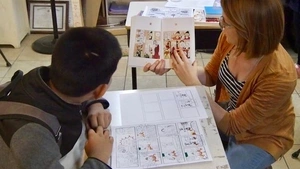Faculty Expert
Admit it. As parents, it’s happened to the best of us. At 6 pm, your quarenteen wanders into your kitchen-now-home-office and utters the words no Covid-wearied, multi-tasking parent wants to hear: “I need heeeeelp.” The onion you just chopped sizzles on the stove. Your eyes move to the text of the Gettysburg Address that is glowing on your child’s cell phone screen. Four-score and seven years ago. Your laptop chirps: incoming message from your boss. The onion burns.
What if you hired a tutor?
For parents who have the economic means to hire a tutor, this old school educational arrangement may seem like a pandemic-ready panacea. Who wouldn’t want a freshly minted college grad handling that essay on the Gettysburg Address? What could go wrong?
Plenty, says Anne Pomerantz, Professor of Practice at Penn’s Graduate School of Education. As an educational linguist, she has been studying tutoring sessions for years. Her data tell us this: Good tutoring is all in the interaction. So, if you’re thinking about hiring a tutor — or helping your children with their schoolwork yourself —read on.
The Size Up
Tutoring, Pomerantz explains, can be a tricky interaction to handle. The child has to procure assistance without being positioned as needy, incapable, unfocused, or worse. This can be a challenge, especially if the tutor is also mom or dad.
One job of a tutor is to figure out what your child can do independently and where your child might need additional support or encouragement. Skilled tutors know that the answers children – and especially adolescents — give to questions like, “do you know how to do this?” will not be particularly illuminating. Such direct questions are often met with eye rolls, jokes, curt yeses, and sometimes even silence.
A better tactic, Pomerantz advises, is to design activities that require your child to show what they know. Good tutors ask children to explain how they solved a particular equation or why they are answering a reading comprehension question in a particular way. These tutors know how “face-threatening” it can be to ask for help. And, they recognize that getting the right answer is not always a sign of deep understanding.
The Negotiation
Tutoring interactions involve a fair amount of negotiation, particularly when the tutor is also the parent. Just as tutors are trying to figure out what tutees know and are able to do, so too are tutees trying to suss out what kind of help the tutor is willing to provide.
Pomerantz notes that children of all ages are very skillful at figuring out what she calls “the terms of engagement.” How eager is this tutor – aka my mom — to show off what she knows about chemistry? How much does my mom want me to finish this? How much of this assignment can I get her to do for me?
If you’ve ever found yourself frantically skimming chapter 4 of a chemistry textbook while your child peruses Tik Tok, you, Pomerantz observes, need to go back to the negotiating table.
The Goal
If you’ve ever looked at your child’s history homework and thought “aha, now is my chance to impart some wisdom” only to have your teachable moment met with a dismissive “Mom, I was just asking if my answer to number 6 is correct — I need to hand my assignment in now,” you’ve experienced a clash among what Pomerantz calls the “three C’s” of tutoring.
Whereas you are oriented toward ensuring that your child comprehends the topic at hand and appreciates its significance, your child is focused on correctness (question 6, right or wrong?) and completion (my assignment is due now).
Pomerantz notes that as families deal with the anxiety and uncertainty of COVID-19 and life more generally in the U.S., small mismatches at the level of interactional goals can quickly morph into big arguments. Thus, it’s important for parents – or anyone acting in the tutor role – to remember that just because we are all engaged in the same conversation does not mean that we all share the same interactional goals.
The Hire
Finally, if you are planning to hire a tutor, ask yourself this: Are you looking for an academic content specialist or an experienced teacher? Many companies promise tutors with sparkly academic credentials and price tags to match. A person with a PhD in math may not be the best fit for a child that is struggling to understand algebraic equations.
Instead, find out how much experience prospective tutors have working with children at your child’s grade level. Ask candidates to send you a “How to” video. You can learn a lot about a person’s teaching style by watching how they explain things to others.
The Bottom Line
Tutoring, Pomerantz notes, is fundamentally a social interaction. No matter how much a tutor or parent knows about physics or French, no learning will happen if attention isn’t paid to the interpersonal dimensions of the encounter. For, as anyone who been in a “helper-helpee” relationship knows: it requires a lot of conversational finesse to procure help without losing face.

Subscribe to the Educator's Playbook
Get the latest release of the Educator's Playbook delivered straight to your inbox.
Media Inquiries
Penn GSE Communications is here to help reporters connect with the education experts they need.










